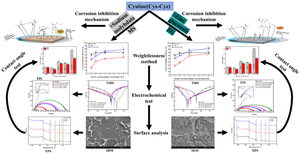Corrosion Inhibition of X100 Pipeline Steel in 1 M HCl by Two Complexes of Cystine
Abstract
Corrosion has been identified as the primary mechanism causing pipeline failures, leading to significant economic losses and environmental problems. One of the effective and economical methods to prevent metal corrosion is to add corrosion inhibitors. Although environmentally friendly corrosion inhibitors are beneficial to the ecological environment, their lower corrosion inhibition efficiency compared to traditional corrosion inhibitors has limited their application. Therefore, this paper aims to develop an environmentally friendly compound corrosion inhibitor that can meet the practical industrial requirements. The corrosion inhibition effect of two complexes of cystine, namely cystine + sodium molybdate (Cys-Cys + MS) and cystine + zinc gluconate (Cys-Cys + ZG), on pipeline steel in 1 M HCl was investigated. And the synergistic corrosion inhibition mechanism of these two composite corrosion inhibitors was discussed. The results indicated that the corrosion inhibition performance of Cys-Cys + MS and Cys-Cys + ZG complexes was significantly better than that single inhibitors at higher concentration. Furthermore, it was observed that the corrosion inhibition performance of Cys-Cys + ZG was superior to that of Cys-Cys + MS. The maximum corrosion inhibition efficiency of the two compound corrosion inhibitors was achieved at the concentration of (2 + 4) mM.
Graphical Abstract


 求助内容:
求助内容: 应助结果提醒方式:
应助结果提醒方式:


